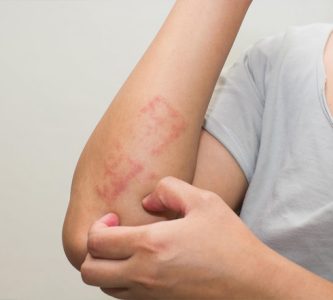- 1 Farrer Park Station Road #12-18 Connexion Singapore 217562
Eczema

What is eczema? What does it look and feel like?
The term ‘eczema’ is used interchangeably with ‘dermatitis’ and refers to inflammation of the skin. Eczema varies from person to person and comes in many different forms. In mild cases, the skin is dry, red and itchy. In more severe cases, the skin may be weepy, scaly or bleeding.
What are the types of eczema?
Atopic eczema
Atopic eczema is the most common type of eczema.
Atopic eczema is the most common type of eczema.
Seborrhoeic dermatitis
Seborrheic dermatitis can occur in babies and adults. It is seen on the oily areas of the body such as the scalp, face, upper chest, back and groin. Seborrhoeic dermatitis is either not itchy or just mildly itchy. When the scalp is affected, dandruff is seen.
Seborrheic dermatitis can occur in babies and adults. It is seen on the oily areas of the body such as the scalp, face, upper chest, back and groin. Seborrhoeic dermatitis is either not itchy or just mildly itchy. When the scalp is affected, dandruff is seen.
Discoid eczema
This presents with itchy, scaly, coin-shaped patches which tend to blister and weep. It commonly occurs on the arms and legs of young adults.
This presents with itchy, scaly, coin-shaped patches which tend to blister and weep. It commonly occurs on the arms and legs of young adults.
Asteatotic eczema
Asteatotic eczema is due to dryness of the skin, especially on the arms and legs of elderly people. It usually presents with an itchy, scaly, red rash on the limbs.
Stasis eczema
Stasis eczema is commonly seen in the elderly and people with varicose veins in the legs. The legs may become swollen, especially at the end of the day or after prolonged standing. The skin is pigmented thick and feels firm to the touch.
Stasis eczema is commonly seen in the elderly and people with varicose veins in the legs. The legs may become swollen, especially at the end of the day or after prolonged standing. The skin is pigmented thick and feels firm to the touch.
Contact dermatitis
Contact dermatitis occurs due to contact with external agents. Irritant contact dermatitis is caused by exposure to irritants such as soaps and detergents. Allergic contact dermatitis is caused by a specific hypersensitivity to an allergen.
Contact dermatitis occurs due to contact with external agents. Irritant contact dermatitis is caused by exposure to irritants such as soaps and detergents. Allergic contact dermatitis is caused by a specific hypersensitivity to an allergen.
What are the possible causes of eczema?
The causes of eczema can be broadly divided into endogenous or exogenous causes. Endogenous causes include causes like our genes, skin dryness and skin barrier function. Exogenous factors refer to external causes like exposure to irritants or allergens. In most patients, a combination of both endogenous and exogenous causes is usually present.
What are the treatment options for eczema?
Topical medications such as topical steroids are commonly prescribed for eczema treatment. Topical steroids are useful in reducing skin inflammation. They are safe if used appropriately. Steroid-free topical medications are also available for the treatment of eczema. For patients with more severe eczema, oral treatments may be necessary. These include oral antibiotics when the skin is infected and antihistamines to reduce the itch. In severe cases of atopic eczema, other treatment options such as phototherapy or systemic immunomodulators may be used.
DISCLAIMER:
The information written and published on this website is not intended to substitute the recommendations of a trained professional and does not replace a professional consultation.
It is advisable to undergo a formal consultation to help establish a relationship between the doctor and yourself, accurately determine your concerns/problems, and get the appropriate treatments for them.
It is also imperative to note that the contents of the website with respect to treatments, results and pricing can vary from individual to individual, and can only be accurately determined by the doctor upon diagnosis.
Do note that all medical treatments will only be administered upon proper consultation, with the requirement that patients be above 21 years of age to provide legal consent.




